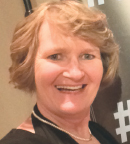
The financial costs of care are just as important—maybe more—as the physical and mental side effects and deserve equal consideration and support.— Donna Piunt
Tweet this quote
Although my diagnosis of stage IIIB melanoma 5 years ago came as a shock, in hindsight, it shouldn’t have been so surprising. I had noticed a small freckle-like lesion on my upper left thigh that had become itchy and occasionally bled, but it didn’t fit the ABCDE (Asymmetry, Border irregularity, Color that is not uniform, Diameter greater than 6 mm, and Evolving size) rule of the characteristics of skin cancers. I was busy completing an online college course, so I ignored the symptoms. Plus, even though I was studying for a degree in medical billing and coding and was becoming familiar with the different types of cancer, melanoma just wasn’t on my radar screen.
I still wasn’t thinking the lesion was anything serious when I saw my primary care physician, who removed the tumor and remarked afterward that she didn’t “like what she was seeing.” The seriousness of my situation finally set in when she called me a few days later to tell me that I had melanoma and rattled off a frightening to-do list: have laboratory and imaging tests to learn the full extent of my cancer and, of course, find an oncologist. The tasks were daunting.
Coping With Treatment
Originally diagnosed as stage IIB nodular melanoma, because one lymph node was positive for cancer, I was restaged to IIIB. I had an inguinal lymph node dissection, followed by 10 months of weekly infusions of interferon-alfa—I wasn’t a good candidate for ipilimumab (Yervoy). I tried to stay positive, but the treatment was grueling, causing daily migraines, severe bouts of vertigo (which I still experience today), and muscle weakness and physical impairments so extreme that I had to spend 2 months in a physical rehabilitation facility to restore functional movement and improve my mobility. Although the physical therapy was difficult to manage, I was determined to get back my stamina and strength; eventually, after using a wheelchair, then a walker, and a cane, I was finally able to walk unaided.
Financial Aftermath of Cancer
But I’m not the same. I know my mental acuity has changed, and I haven’t been able to pursue a career in medical billing and coding or go back to work in any full-time capacity. The cancer has left its mark on me in other ways, too. The combination of the loss of income from not being able to work and the spiraling medical costs related to my cancer, including high insurance co-payments and travel expenses to and from the cancer center, resulted in my husband and I losing our home.
The financial consequence of cancer is a reality I wish oncologists would address directly when suggesting a treatment plan. Oncologists often ask patients whether they need supportive care for their physical and mental issues resulting from their cancer and its treatment, but they often shy away from enquiring about patients’ financial well-being and referring them to resources for financial aid. Patients need to know the cost of treatment, so they can make an informed decision about their care. The financial costs of care are just as important—maybe more—as the physical and mental side effects and deserve equal consideration and support.
Thriving After Cancer
When you are a cancer survivor, you live your life in segments of time—3 months to the next skin check, 6 months to the next image scan—so cancer is never far from your mind. But I’m thrilled to say that currently there is no evidence of melanoma in my body. Since my diagnosis, every day is a gift, and I wear myself out trying to pack in as much as I can into every moment.
My main goal now is to help as many other cancer survivors as I can receive the emotional and social support they need to overcome the impact of cancer on their lives. I’ve become an advocate for melanoma causes and spend much of my time participating in programs developed by the Cancer Support Community, a worldwide nonprofit network of cancer support activities.
I was fortunate when I was diagnosed. I have a supportive and loving husband and family and have never felt alone while going through my treatment or any day since then. I want every cancer survivor to have that same level of caring and support, so they, too, can survive—and thrive—after cancer. ■
Ms. Piunt lives in Pottstown, Pennsylvania.

